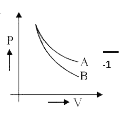Temperature of 1mol of a gas is increased by 1∘ at constant pressure. The work done is
R
2R
R/2
−R
The correct Answer is:4
To solve the problem of calculating the work done when the temperature of 1 mole of gas is increased by 1°C at constant pressure, we can follow these steps:
Step 1: Understand the Work Done Formula
The work done (W) by a gas during expansion or compression at constant pressure is given by the formula:
W=−PΔV
where P is the pressure and ΔV is the change in volume.
Step 2: Relate Work Done to Temperature Change
At constant pressure, we can relate the change in volume to the change in temperature using the ideal gas law. The ideal gas law states:
PV=nRT
Differentiating this with respect to temperature at constant pressure gives:
PdV=nRdT
Thus, we can express the work done as:
W=−PdV=−nRdT
Step 3: Substitute Known Values
In the problem, we have:
- n=1 mole (given)
- dT=1 °C (which is equivalent to 1 K for calculations in thermodynamics)
- R is the universal gas constant, approximately 8.314J/(mol K)
Now substituting these values into the equation for work done:
W=−nRdT=−1×R×1
W=−R
Step 4: Final Calculation
Substituting the value of R:
W=−8.314J
Conclusion
The work done when the temperature of 1 mole of gas is increased by 1°C at constant pressure is:
W=−8.314J
The work done (W) by a gas during expansion or compression at constant pressure is given by the formula:
W=−PΔV
where P is the pressure and ΔV is the change in volume.
At constant pressure, we can relate the change in volume to the change in temperature using the ideal gas law. The ideal gas law states:
PV=nRT
Differentiating this with respect to temperature at constant pressure gives:
PdV=nRdT
Thus, we can express the work done as:
W=−PdV=−nRdT
In the problem, we have:
- n=1 mole (given)
- dT=1 °C (which is equivalent to 1 K for calculations in thermodynamics)
- R is the universal gas constant, approximately 8.314J/(mol K)
W=−nRdT=−1×R×1
W=−R
Substituting the value of R:
W=−8.314J
The work done when the temperature of 1 mole of gas is increased by 1°C at constant pressure is:
W=−8.314J
Topper's Solved these Questions
- THERMODYNAMIC & THERMOCHEMISTRYBook:RESONANCE ENGLISHChapter:THERMODYNAMIC & THERMOCHEMISTRYExercise:INORGANIC CHEMISTRY(P-Block Elements)
Explore 26 Videos
- STRUCTURAL IDENTIFICATION & PRACTICAL ORGANIC CHEMISTRYBook:RESONANCE ENGLISHChapter:STRUCTURAL IDENTIFICATION & PRACTICAL ORGANIC CHEMISTRYExercise:Section -B
Explore 18 Videos
Similar Questions
Knowledge Check
A sample of gas has a volume of V1 litre at temperature t1.∘C. When the temperature of the gas is changed to t2.∘C at constant pressure, then the volume of the gas was found to increase by 10%. The percentage increase in temperature is
A0.1B(10+2730t1)%C20%D(0.1+t−11)%
Temperature of 1 mole of a gas is increased by 2∘C at constant pressure. Work done is :
View SolutionThe temperature of a given mass of a gas is increased from 19∘C to 20∘C at constant pressure. The volume V of the gas is
View SolutionThe gas constant R represents work done
View SolutionTemperature of two moles of an ideal gas is increased by 300K in a process V=aT, where a is positive constant. Find work done by the gas in the given process.
View SolutionThe volume of a gas expands by 0.25m3 at a constant pressure of 103Nm2. The work done is equal to
View SolutionIn a process V∝T2, temperature of 2 moles of a gas is increased by 200K. Work done by the gas in this process will be
View SolutionThe work done by one mole of ideal gas when its teperature is increased by 1oC at constant pressure is
View Solution


